AI solutions
What we do
Services
Experts in
How we work
Did you know that nearly 23% of the US population experienced a mental illness in the past year?
No wonder the demand for self-help apps is rising.
For our team, the tendency is also clear: In the last two years, we’ve received more requests for mental help app development than ever before. We have significant experience with healthcare software development services and helped our clients bring a few worthy apps to life:
To build outstanding apps, our business analysts conduct deep startup market research. Yes, we need to know what products are shaking up the market right now! Do you want to meet the meditation app innovators?
In this section, we highlight our key findings from the past year. 9 emerging startups that are well positioned to influence the mental health and meditation landscape throughout 2026.
To make this more than a random list, we’ve established a clear selection process. We’re spotlighting startups that are innovating and scaling fast. Here are the criteria we are looking for::
Many people have heard about the Headspace meditation app or Calm, the first meditation startup unicorn. But they are not on our list. Our picks offer fresh, innovative solutions to mindfulness. Ready to explore? Here’s our list of 9 must-watch companies that are redefining mindfulness.
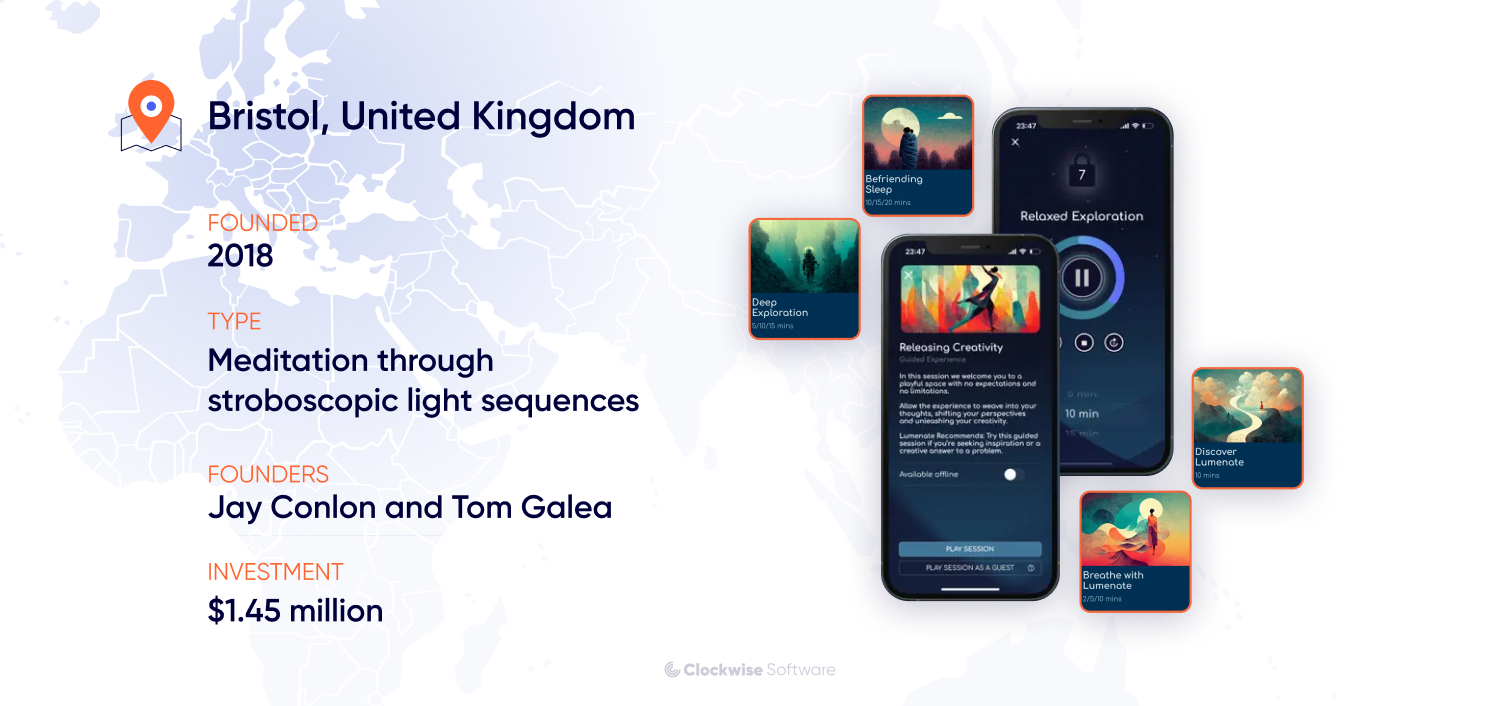
Lumenate stands out as a unique meditation startup with a bold mission: to guide users into altered states of consciousness through stroboscopic light sequences from a smartphone’s flashlight. This tech aims to blend deep meditation with a psychedelic-like experience, helping users explore their subconscious, relax, and even improve sleep.
The science behind the app is fascinating. The Lumenate team explains that neurons in the brain respond to flashing light by syncing their rhythms with its frequency. This synchronization allows users to quickly enter a deeply meditative state. For those looking for new meditation experiences, Lumenate’s mix of light technology and neuroscience could be a game-changer.
Lumenate’s journey began in 2018 with co-founders Jay Conlon and Tom Galea, who met while studying engineering at the University of Liverpool. They later worked together at Jaguar Land Rover designing futuristic concept vehicles.
After stepping away from their corporate roles, Conlon and Galea dedicated three years to building Lumenate (perhaps they hadn’t read our article on how long it takes to build an app).
A key factor in Lumenate’s growth has been a celebrity endorsement. Actress Rosamund Pike, an early tester, was so captivated that she not only invested but also became the company’s creative director. With Pike on board, Lumenate raised $1.45 million from several venture capital firms.
The company is also partnering with researchers at Freie Universität Berlin and Imperial College London to deepen their understanding of the technology’s neurological impact. Recently, Lumenate joined forces with the John Lennon Estate to release nine reimagined Mind Games Meditation Mixes.
With over 700,000 downloads and 20,000 monthly active users, Lumenate proves that innovative tech can attract a dedicated niche audience and make waves in the wellness space.
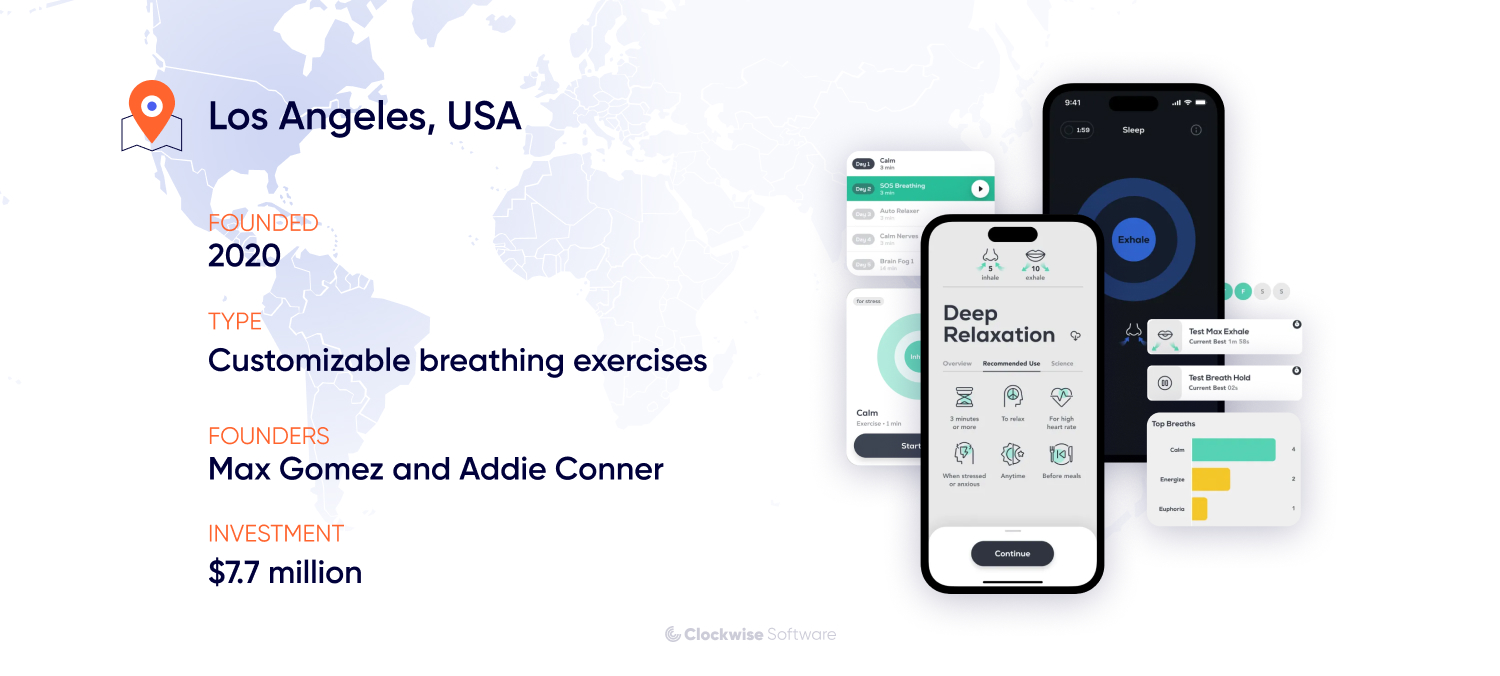
Breathwrk stands out in the crowded field of breathing apps, putting powerful breathing techniques right at your fingertips. This mindfulness startup offers customizable breathing exercises designed for specific needs, including calming down, boosting energy, sharpening focus, and winding down for sleep.
With visual, auditory, and vibrational guidance, Breathwrk makes it easy to take control of your mental state.
Founded in 2020 by Max Gomez and Addie Conner, Breathwrk has grown quickly. Gomez, now the CEO, brought a wealth of experience from his role as Chief Product Officer at Confidently, another wellness company.
Conner, initially serving as CMO, is a prominent figure in marketing as the founder of SocialCode and former Chief Innovation Officer at Decoded Advertising.
Breathwrk launched at a time when wellness apps were flooding the market. But it stood out thanks to its user-friendly interface, broad variety of breathing routines, and integration of visuals, sounds, and vibrations.
In March 2021, the app secured $3 million in a seed round, attracting both venture capital firms and individual investors. Just a year later, it raised additional funding, bringing total investment to $7.7 million.
This financial boost allowed Breathwrk to expand its library of exercises, form strategic partnerships, and explore new markets. Today, Breathwrk has around 1.2 million active users, setting itself apart by offering a highly customizable, user-centric experience.
Breathwrk’s journey shows how focusing on user-friendly design and personalization can carve out a space in even the most competitive niches.
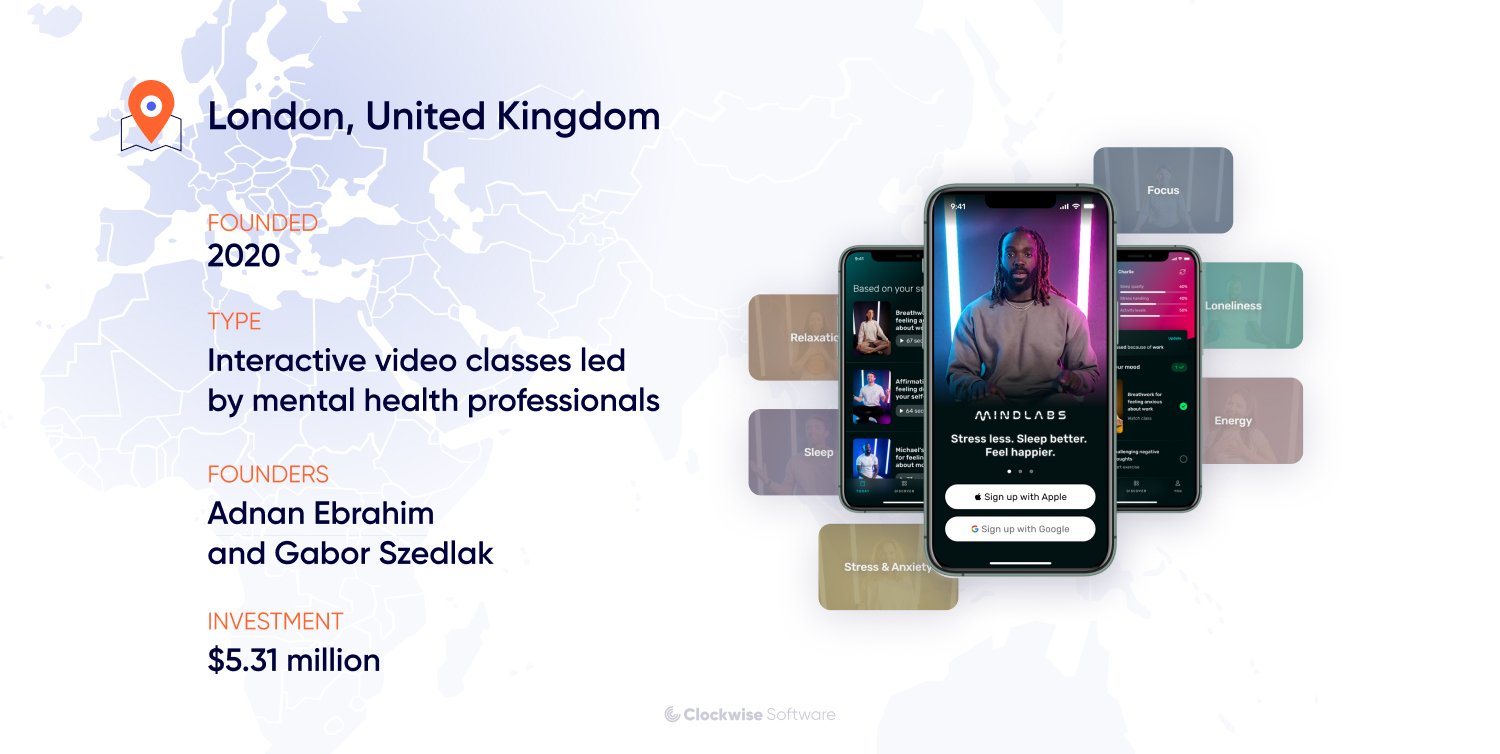
MindLabs is a mental health startup offering live and on-demand video classes to tackle stress, anxiety, and more. Unlike companies like Headspace, MindLabs features interactive classes led by mental health professionals.
Users get real-time support, and by syncing with wearables, MindLabs tracks metrics like heart rate to show the immediate impact of wellness practices.
The company was founded in 2020 by Adnan Ebrahim and Gabor Szedlak, former creators of Car Throttle, a popular platform for car enthusiasts. After selling Car Throttle in 2019, they turned their focus to mental health, applying their expertise in digital growth to a new field.
MindLabs shows how industry experience isn’t always necessary. By leveraging skills in building online communities, Ebrahim and Szedlak tapped into the booming mindfulness niche. In October 2020, they raised $1.81 million in seed funding, followed by an additional $3.5 million in 2021 from Passion Capital and Indeed co-founder Paul Forster.
Since launching in 2021, MindLabs has grown its expert team and offers a diverse library of live and on-demand classes.
Looking to engage users? The success of MindLabs shows that adding real-time interaction can make all the difference.
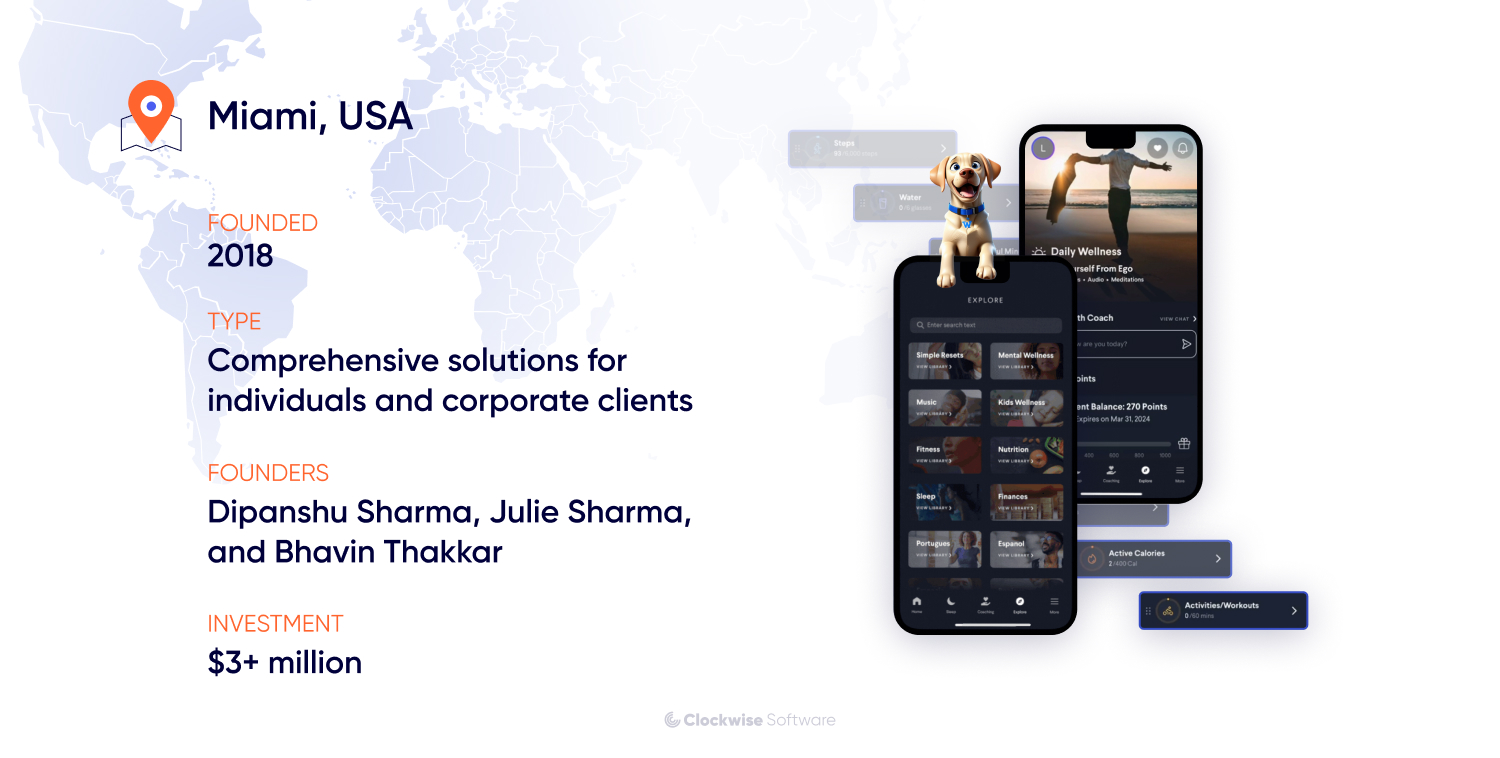
Wellness Coach (formerly Meditation.live) offers a suite of wellness tools for individuals and corporate clients alike. The app covers all bases with guided meditation, sleep aids, fitness classes, mental health coaching, and nutrition advice. Users can access expert-led live and on-demand video and audio sessions, along with live group coaching.
Originally focused on streaming meditation sessions, Wellness Coach has now expanded to partner with organizations, providing wellness resources as part of corporate initiatives.
Founded in 2018 by Dipanshu Sharma, Julie Sharma, and Bhartesh Chhibbar, the company launched under the name Meditation.live.
Dipanshu Sharma, serving as CEO, brings a wealth of experience as the former co-founder of Exponential Interactive, a major digital advertising company.
Julie Sharma and Bhartesh Chhibbar also bring solid expertise in business development and management, making for a strong team.
After securing initial funding in 2018, Wellness Coach raised $3 million from SoftBank Capital and individual investors, including former Linkedin CEO Jeff Weiner. This funding fueled Wellness Coach’s growth into an all-in-one wellness platform that supports meditation, fitness, coaching, and corporate wellness.
Wellness Coach is a great example for entrepreneurs of how recognizing trends and pivoting can take a product to the next level, even after building MVP and hitting the market. By evolving its focus and adding corporate wellness programs, the company set itself apart from similar apps that launched around the same time.
Now, Wellness Coach is a leading mental health app for corporate clients, integrating seamlessly with Microsoft Teams, Slack, and Zoom.
Wellness Coach shows the value of pivoting and expanding your offerings. If the market calls for a more comprehensive solution, don’t hesitate to rebrand or broaden your product’s reach.
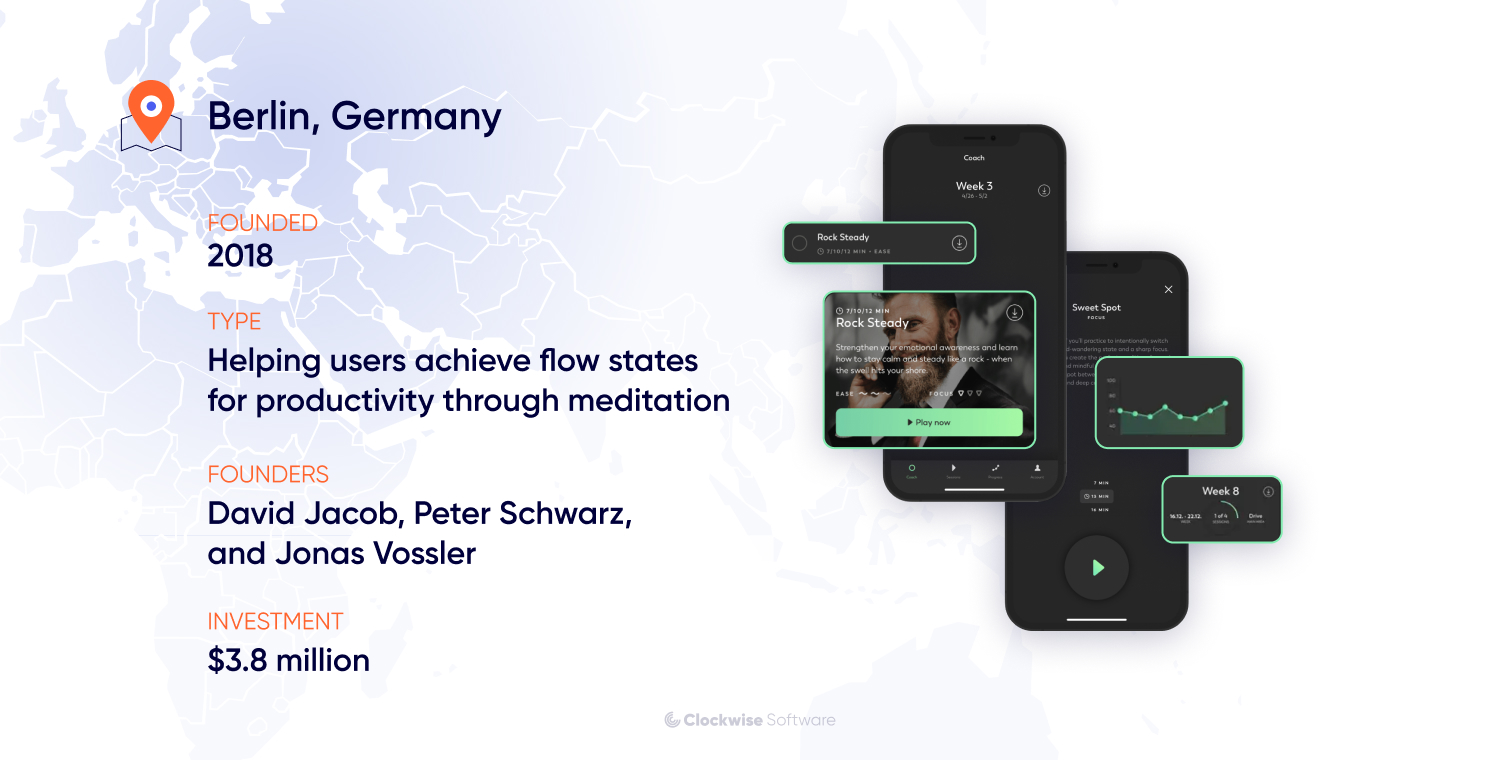
Flow Lab is a meditation and mindfulness app with a unique twist. Unlike most apps that focus on stress relief and relaxation, Flow Lab helps users achieve “flow states” — those optimal mental states where you feel focused, productive, and fully immersed in what you’re doing.
If productivity and focus are your goals, Flow Lab’s science-backed approach could be the key to getting in the zone faster.
Founded in 2018 by David Jacob, Peter Schwarz, and Jonas Vossler, Flow Lab combines diverse expertise across software, design, and entrepreneurship.
Schwarz brings a strong background in software development, Jacob previously worked in design, and Vossler focused on startup ecosystems in his university research. Together, they’ve created a truly standout product in the mindfulness space.
In 2020, Flow Lab secured $316,000 from an angel investor, allowing them to enhance their early platform with basic guided sessions. The team then added modes for specific goals, like Deep Work and Creativity, plus personalization features.
In2021, Flow Lab raised an additional $1.22 million in seed funding, followed by another round of investments the same year, bringing total funding to $2.27 million.
This funding has fueled Flow Lab’s continuous development. New features include detailed progress tracking, personalized insights, community-driven content, and curated audio experiences. The company’s vision? To build a comprehensive mental health tool for high performers, blending positive psychology, cognitive science, and meditation techniques.
Flow Lab’s story shows that mindfulness isn’t just about relaxation. They’re proving that there’s always room for unconventional solutions in the wellness space. Who says mindfulness can’t be about productivity?
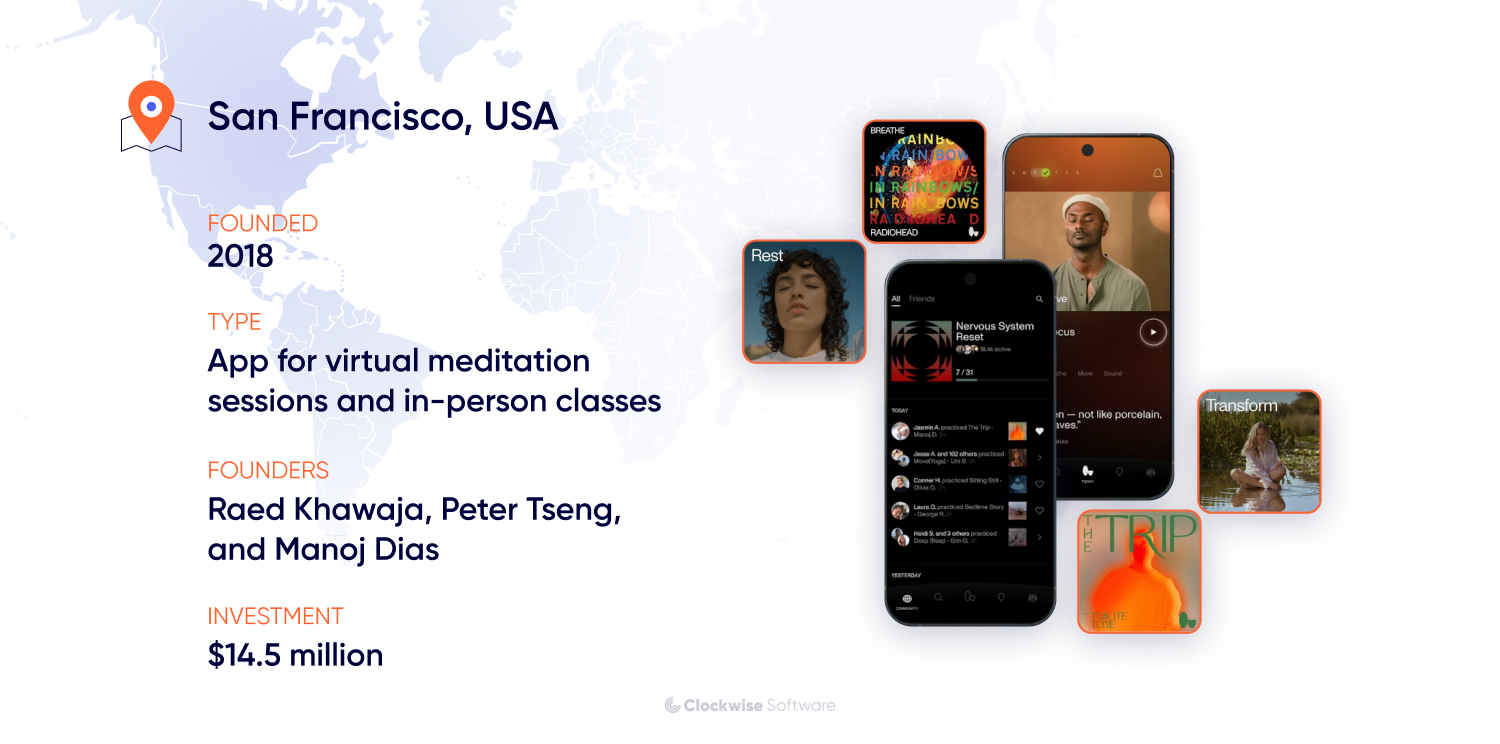
Open offers a unique mix of virtual and in-person wellness experiences. Users can join guided meditation and breathwork sessions from anywhere via the app or website — or attend in-person classes at select locations.
Building a community is at the heart of Open’s philosophy: the app encourages users to connect, interact, and practice together.
Founded in 2018 by Raed Khawaja, Peter Tseng, and Manoj Dias, Open draws from a range of expertise.
Khawaja, now the CEO, has a background in finance and consumer goods and has worked with Bank of America, PepsiCo, and freelance platform Jyve.
CTO Peter Tseng previously worked as a software engineer at companies including DoorDash.
Meanwhile, Manoj Dias brings years of experience as a meditation teacher and mindfulness consultant. He also has multiple successful mindfulness businesses under his belt.
Open initially focused on accessible pop-up meditation and mindfulness events, hosting over 100 in-person sessions in San Francisco by 2019.
When the pandemic hit, the team quickly pivoted to digital, launching an app in 2020 that offered a blend of meditation, yoga, breathwork, and soundscapes. This transition helped Open maintain its community while adapting to new needs.
In 2019, Open raised $5.5 million in seed funding, followed by a $9 million Series A funding round in 2022. With the success of their app, they returned to in-person sessions, opening a dedicated space in Los Angeles. This hybrid wellness model, combining both physical and digital offerings, means every user can find the experience that suits them best.
By blending physical spaces with digital access, you can meet users where they are — offering both the personal touch of in-person interaction and the convenience of remote access. This approach caters to diverse preferences and opens up more ways for users to stay engaged, no matter how they like to connect.
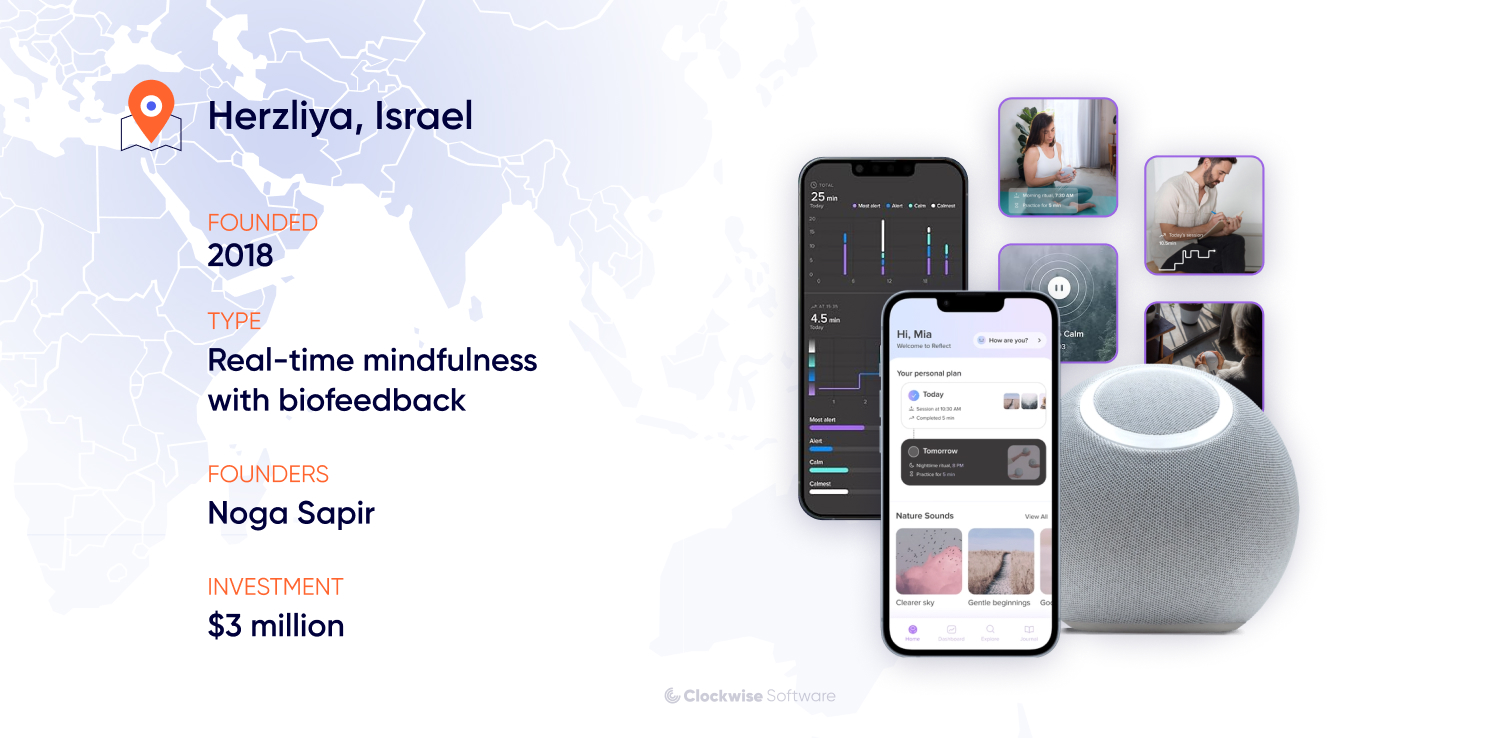
Reflect is revolutionizing the mindfulness industry with its unique blend of IoT and biofeedback. Paired with a biofeedback device called the Reflect Orb, this meditation app allows users to monitor and analyze their mental and emotional states in real time during sessions.
Reflect Orb brings biofeedback to a whole new level, helping users track progress and use real-time data to enhance their meditation practice.
Reflect’s founder and CEO, Noga Sapir, combines her backgrounds in neuroscience and textile design to lead the company.
After seven years as a QA engineer, Sapir decided to merge her expertise to create the Reflect Orb — a device aimed at helping users manage stress and anxiety through biofeedback and mindfulness.
Since launching its app in 2018, Reflect quickly gained its first customers and has continued to grow. In 2021, the company raised $3 million in a seed round from Joy Ventures, a fund known for supporting wellness and mental health companies..
With this investment, Reflect added features like a data-tracking dashboard, daily journals, and a knowledge center filled with educational content.
Today, Reflect is enhancing its user experience even further. Users can now customize session lengths, adjust LED brightness, and set the Reflect Orb’s rhythm. Reflect is also fostering an online community, encouraging users to connect and working with mindfulness experts to curate specialized content.
Reflect shows the potential of combining IoT with mindfulness. Integrating a physical device that offers real-time feedback can create a deeper, more engaging experience for users.
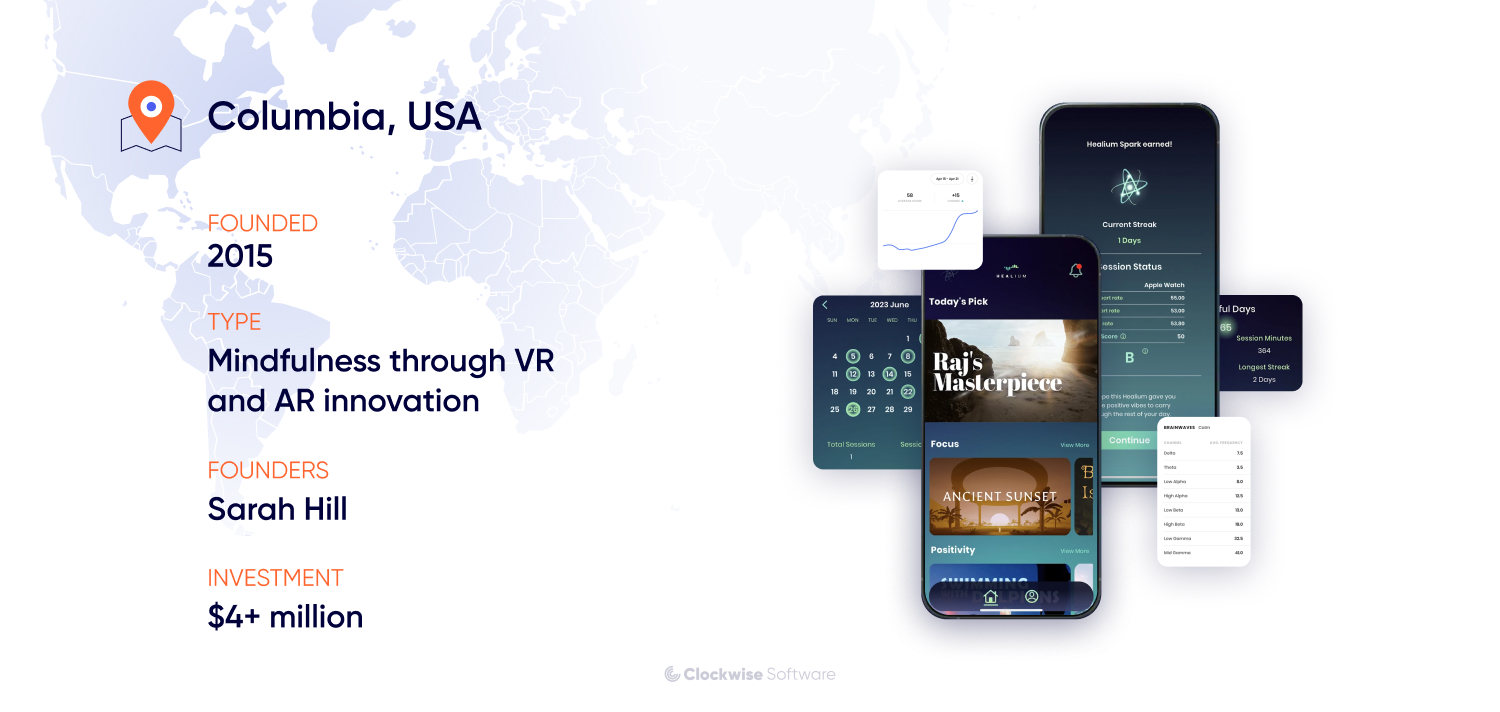
Healium started as one of many VR apps offering calming virtual environments, such as serene landscapes and soothing scenes. But in recent years, the company has taken things to a new level by integrating wearable technology.
In 2020, Healium began using heart rate monitors and EEG headbands, allowing users to see visual representations of their mental states in VR. This feature sets Healium apart, making it one of the most unique mindfulness tools on the market.
Founded in 2015 by Sarah Hill, a former news anchor and media strategist, Healium was born out of Hill’s experience working as a video storyteller for Veterans United Network. Inspired to create a tool for managing anxiety and stress, Hill decided to make VR the core of Healium’s experience.
After developing a proof of concept, Healium secured funding from angel investors and early-stage venture firms. In 2023, the company raised over $4 million across two funding rounds, fueling major upgrades to the Healium app.
Recently, Healium added AR capabilities, expanding access to users without VR headsets. The company has also partnered with wellness centers, mental health professionals, and corporations eager to offer mindfulness solutions to their employees.
To solidify its impact, Healium conducted scientific studies showing how its VR and AR experiences reduce anxiety and improve mental health — research now published in peer-reviewed journals.
Healium’s journey is a reminder of the power of credibility. Partnering with researchers to validate your product can be a game-changer, demonstrating legitimacy and winning users’ trust.
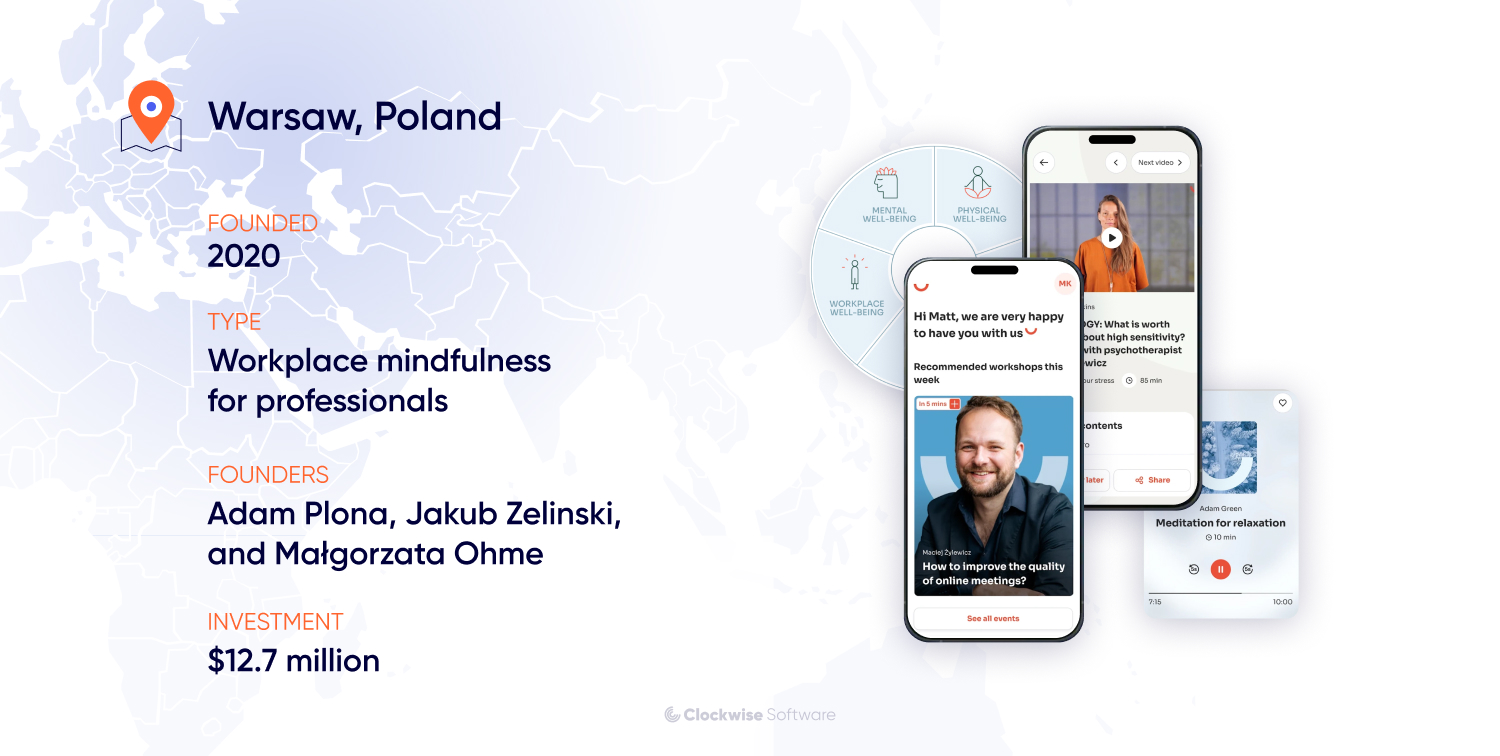
Mindgram is a B2B meditation and mindfulness app designed to support employees’ mental health. For professionals facing workplace stress, Mindgram offers short, work-friendly meditation exercises that make it easy to relax anytime during the day.
From mindfulness and breathing techniques to visualization, users can choose practices that fit seamlessly into their work routine.
Founded in 2020 by Adam Plona, Jakub Zelinski, and Małgorzata Ohme, Mindgram draws on a powerful range of expertise.
CEO Adam Plona has an impressive background, leading product development in several online ventures.
Jakub Zelinski brings experience in healthcare and wellness startups, while Małgorzata Ohme is a recognized journalist and lifestyle figure in Poland.
In 2021, Mindgram raised $9.5 million across two seed rounds from European venture capital firms, allowing the app to evolve from a basic meditation platform into a comprehensive mental health solution. In early 2024, Mindgram secured another $2.7 million in a Series A round to fuel further growth.
With these new funds, Mindgram is enhancing its capabilities. Understanding AI meaning for business today, Mindgram continues to refine the app’s algorithms to more accurately analyze user behavior and provide tailored recommendations.
Mindgram also integrates with wearables and health apps, and the company is expanding to new regions beyond Europe with localized versions for additional countries.
Mindgram’s story shows the value of truly understanding your audience. Delivering quick, effective content tailored to busy professionals can be a winning strategy in the corporate wellness space.
In the last five years, the wellness industry has undergone an incredible transformation. Meditation and mindfulness companies have reshaped how people around the world access tools for relaxation and mental health. Alongside this shift, demand for fitness app development services has grown, as startups look to blend mental and physical wellness into unified digital experiences. Meditation startups we’ve chosen don’t just offer innovative products — they also embody key trends that are shaping the future of wellness:
This list offers a glimpse into the future of the meditation app industry. These startups are pushing boundaries and are worth exploring. Take a look and find the app that resonates with you.
And if you’re planning to create a wellness startup, now’s the perfect time. The market is booming, and users are seeking innovative meditation apps. Whether you’re worried about competition, unfamiliar with web and mobile app development trends, or unsure how to integrate AI and biofeedback, we’re here to help you bring your vision to life.
